| Srl | Item |
| 1 |
ID:
102429
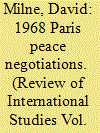

|
|
|
|
|
| Publication |
2011.
|
| Summary/Abstract |
This article draws on fresh archival research to challenge Robert Putnam's 'Two Level Game Theory'. In his seminal article, 'Diplomacy and Domestic Politics: The Logic of Two Level Games', published by International Organization in 1988, Putnam contended that international negotiations proceed at the domestic level and at the international level. In taking diplomatic initiatives forward, leaders are compelled to respond to the needs of domestic constituencies, through granting concessions and building coalitions, while international negotiations are pursued with one goal in mind: that any agreement will not damage the domestic political calculus. This article contends that Lyndon Johnson's actions in 1968 disprove this thesis. The President was in fact relaxed about a Richard Nixon victory in the general election as his commitment to defend South Vietnam from communism was stronger than that of his sitting Vice President, Hubert Humphrey. The President's concern for the fate of South Vietnam thus superseded his concern for his 'normal supporters'- the Democratic Party at large - who had become so hostile towards his management of the Vietnam War.
|
|
|
|
|
|
|
|
|
|
|
|
|
|
|
|
| 2 |
ID:
120301
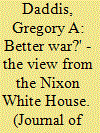

|
|
|
|
|
| Publication |
2013.
|
| Summary/Abstract |
This article examines the relationship between the White House and the US Military Assistance Command, Vietnam (MACV) during President Richard M. Nixon's administration. It argues that dysfunctional civil-military relations between 1969 and 1972 undermined the implementation of a sound military strategy during the United States' withdrawal from South Vietnam as Nixon attempted to achieve 'peace with honor' during the Vietnam War's final campaigns. By 1972, the relationship between the White House and MACV headquarters had reached the nadir of civil-military relations during the Southeast Asian conflict and had served to undercut the United States' ability to effectively disengage from a long and bitterly contested war.
|
|
|
|
|
|
|
|
|
|
|
|
|
|
|
|
| 3 |
ID:
114119


|
|
|
|
|
| Publication |
2012.
|
| Summary/Abstract |
For decades, U.S. China policy has been driven by a combination of engagement and balancing. The Obama administration has put too much weight on the first, and diplomatic happy talk has done nothing to halt Beijing's military buildup. The next administration should get real about China and bolster the balancing half of Washington's strategic equation.
|
|
|
|
|
|
|
|
|
|
|
|
|
|
|
|
| 4 |
ID:
153939
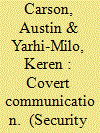

|
|
|
|
|
| Summary/Abstract |
Can states credibly communicate their intentions through covert policy tools, despite the absence of credibility-enhancing publicity? Most extant research suggests covert action and secrecy in general are uniquely uninformative and often used as an alternative to signaling. Yet episodes such as Richard Nixon's secret bombing of Cambodia suggest that leaders have used covert action to convey intentions and coerce adversaries. This article builds a theoretical framework for understanding signaling in the covert sphere, developing reasons why states find covert communication both intelligible (that is, the basic intended message is understandable) and credible (that is, the message is believable). We argue that two target audiences—local allies and strategic adversaries—tend to observe covert action and that the costs and risks incurred by initiating and expanding covert action credibly convey resolve. We assess our arguments empirically through careful process tracing of a set of nested covert interventions by Soviet and American leaders in conflicts in Angola and Afghanistan. Drawing on a trove of recently declassified material, we assess intentions and inferences related to covert signaling. We find that both strategic adversaries and local partners observed and drew inferences about resolve. Covert lethal aid programs thereby served as a credible indicator of resolve through three mechanisms we identify in the paper: sunk costs, counter-escalation risks, and domestic political risks. These findings have important implications for the study of coercive bargaining, secrecy, and reputation. They also shed light on an important policy tool contemporary policymakers will likely use, suggesting the kinds of effects covert action has and elucidating the basic interpretive framework needed to communicate messages with new methods like covert cyber attacks.
|
|
|
|
|
|
|
|
|
|
|
|
|
|
|
|
| 5 |
ID:
128714
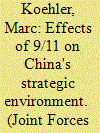

|
|
|
| 6 |
ID:
154816


|
|
|
|
|
| Summary/Abstract |
The years following the signature of the Nuclear Non-Proliferation Treaty (NPT) of 1968 have generally been seen as a period of neglect in US non-proliferation policy. While joining recent scholarship questioning this, the article also shows that the policies that emerged from the Nixon–Ford years were the product of a broad range of factors that constrained both the United States’ ability and willingness to build an effective non-proliferation regime. These included the Nixon administration’s initial skepticism regarding the NPT, as well as the global dispersion of power away from the US, combined with the continued importance of anti-Soviet containment.
|
|
|
|
|
|
|
|
|
|
|
|
|
|
|
|
| 7 |
ID:
110316


|
|
|
|
|
| Publication |
2012.
|
| Summary/Abstract |
OF ALL the U.S. presidents since Franklin Roosevelt, none stands taller in history or exercises a greater lingering influence on American politics than Ronald Reagan. Republican politicians invoke his name as example and lodestar, and Democrats have granted him increasing respect as the passions of his presidential years have ebbed with time. Surveys of academics on presidential performance, initially dismissive, now rank him among the best of the White House breed. Even President Obama has extolled his approach to presidential leadership.
|
|
|
|
|
|
|
|
|
|
|
|
|
|
|
|
| 8 |
ID:
130371
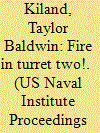

|
|
|
| 9 |
ID:
106709
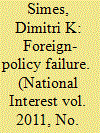

|
|
|
| 10 |
ID:
118887


|
|
|
| 11 |
ID:
089214


|
|
|
|
|
| Publication |
2009.
|
| Summary/Abstract |
The premise of my presidential address, and now this published version of the talk, is that domestic partisan, the struggle for power at home, has played, and no doubt continues to play, a substantial role in the making and direction of American foreign policy.
|
|
|
|
|
|
|
|
|
|
|
|
|
|
|
|
| 12 |
ID:
100452
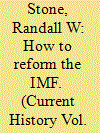

|
|
|
| 13 |
ID:
121226
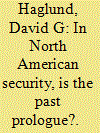

|
|
|
|
|
| Publication |
2012.
|
| Summary/Abstract |
There is nothing unusual about positing security issues as "problems"; after
all, it was not so terribly long ago that the central dilemma in international
security regularly, and not incorrectly, bore the label, the "German Problem"
(in some variants, the "German Question").1
I have myself, on occasion,
even employed the concept of problem to frame discussions of historical
and contemporary policy dilemmas associated with aspects of North
American security-albeit on the understanding that somehow the source
of the contention inhered in actions or perceptions linked to American
policymakers, the assumption being that it was Canadians who were left
facing the "problem" in question.
|
|
|
|
|
|
|
|
|
|
|
|
|
|
|
|
| 14 |
ID:
096047
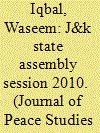

|
|
|
| 15 |
ID:
098401


|
|
|
|
|
| Publication |
2010.
|
| Summary/Abstract |
The worst thing Washington could do is to operate on autopilot, to assume that past strategies and policies (which have generally served the United States well) are ipso facto indefinitely useful.
|
|
|
|
|
|
|
|
|
|
|
|
|
|
|
|
| 16 |
ID:
074720
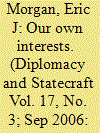

|
|
|
| 17 |
ID:
040504


|
|
|
|
|
| Publication |
New York, Harper and Row, Publishers, 1975.
|
| Description |
189p.Hbk
|
| Standard Number |
0060138696
|
|
|
|
|
|
|
|
|
|
|
|
Copies: C:1/I:0,R:0,Q:0
Circulation
| Accession# | Call# | Current Location | Status | Policy | Location |
| 015935 | 923.173/SID 015935 | Main | On Shelf | General | |
|
|
|
|
| 18 |
ID:
094325
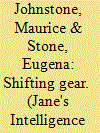

|
|
|
| 19 |
ID:
153462
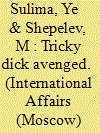

|
|
|
|
|
| Summary/Abstract |
INAUGURATED ON JANUARY 20, 2017 as the 45th President of the United States, Donald John Trump was well known to the nation as a businessman who had never filled any state posts and never craved the presidency. Back in 1990, he said: "I don't want to be President. I'm one hundred percent sure. I'd change my mind only if I saw this country continue to go down the tubes."1 This means that by 2015 when he decided to run on his own money, without sponsors and lobbyists, to become the best American president he had been absolutely sure that the country was going down the tubes.
|
|
|
|
|
|
|
|
|
|
|
|
|
|
|
|
| 20 |
ID:
120530
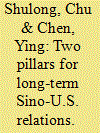

|
|
|
|
|
| Publication |
2013.
|
| Summary/Abstract |
Sino-U.S. relationship has been supported by two pillars: one being their shared interests and points in common, and the other being that neither side has challenged, threatened or opposed each other's core interests. The two powers should continue to strengthen these two pillars in order to maintain stable and positive relations.
|
|
|
|
|
|
|
|
|
|
|
|
|
|
|
|